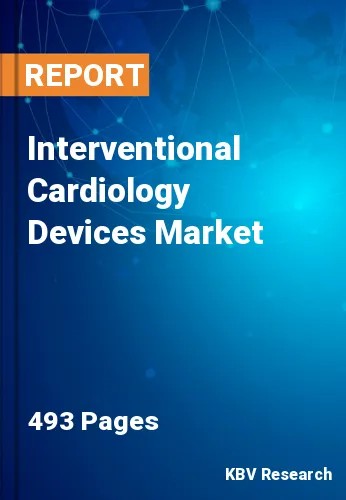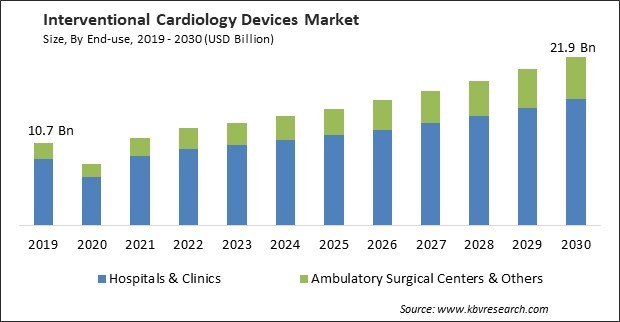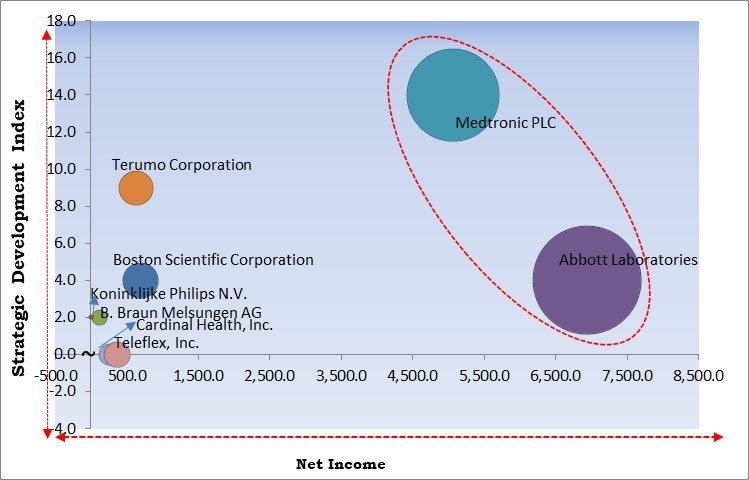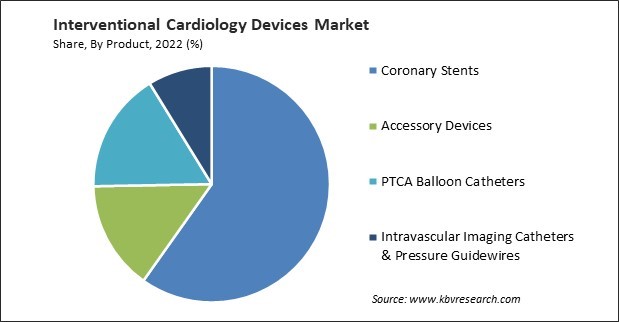
The Global Interventional Cardiology Devices Market size is expected to reach $21.9 billion by 2030, rising at a market growth of 7.4% CAGR during the forecast period. In the year 2022, the market attained a volume of 62,100.5 thousand units experiencing a growth of 7.3% (2019-2022).
The drug coating on drug eluting stents (DES) elutes slowly over time, inhibiting tissue growth that can lead to restenosis. This has led to improved long-term outcomes for patients. Consequently, the drug eluting stents segment would generate approximately 53.1% share of the market by 2030. The lower restenosis rates associated with DES have reduced the need for repeat interventions, such as additional angioplasty or stent placement. This translates to improved patient outcomes and reduced healthcare costs. DES has been associated with a lower risk of stent thrombosis (a potentially life-threatening complication), particularly when patients adhere to dual antiplatelet therapy (DAPT).

The major strategies followed by the market participants are Partnerships, Collaborations & Agreements as the key developmental strategy to keep pace with the changing demands of end users. For instance, In June, 2023, Koninklijke Philips N.V. collaborated with Biotronik, to widen the range of cardiovascular devices available for Philips SymphonySuite customers. In January, 2023, Terumo collaborated with Siemens Healthineers, to make better heart care available to more people.
Based on the Analysis presented in the KBV Cardinal matrix; Abbott Laboratories and Medtronic PLC are the forerunners in the Interventional Cardiology Devices Market. Companies such as Terumo Corporation, Boston Scientific Corporation and Teleflex, Inc. are some of the key innovators in the Interventional Cardiology Devices Market. In September 2021, Terumo came into collaboration with Etiometry, to provide clinicians with an in-depth understanding of the patient's condition.

During the early stages of the pandemic, many elective and non-urgent interventional cardiology procedures were postponed or canceled to prioritize the treatment of COVID-19 patients and to conserve healthcare resources. This led to a temporary decline in cardiac procedures and reduced use of related devices. Hospitals and healthcare facilities shifted their focus toward treating emergent and high-priority cases, such as acute myocardial infarctions (heart attacks), which continued to require interventional cardiology procedures. Delays in producing and distributing interventional cardiology devices, including stents, catheters, and guidewires, affected the market. With the need to limit in-person interactions and reduce the risk of virus transmission, there was a greater emphasis on remote monitoring of cardiac patients. Thus, the COVID-19 pandemic had a moderate effect on the market.
Cardiovascular diseases (CVDs) such as coronary artery disease (CAD), heart attacks, and heart failure remain a leading cause of morbidity and mortality globally. The growing prevalence of CVDs drives the demand for interventional cardiology procedures and devices. Cardiovascular diseases are among the leading causes of morbidity and mortality globally. They affect millions of people, resulting in a substantial patient population in need of diagnosis and treatment. As the global population ages, there is a higher incidence of age-related cardiovascular conditions. Older adults are more susceptible to CVDs, increasing the demand for cardiovascular interventions and devices. As the global burden of CVDs continues to increase, the market for interventional cardiology devices is expected to expand to meet the growing healthcare needs.
As the global population ages, there is a higher incidence of age-related cardiovascular conditions. Older adults are more likely to require interventional cardiology interventions, such as stenting and angioplasty. Aging is a major risk factor for cardiovascular diseases (CVDs) such as coronary artery disease (CAD), heart attacks, heart failure, and arrhythmias. Individuals are more likely to develop these conditions as they age, leading to an increased demand for interventional cardiology procedures and devices. Aging is associated with the progressive buildup of atherosclerotic plaques in the coronary arteries. As a result, older individuals are at a higher risk of experiencing acute coronary events, such as heart attacks, which require urgent intervention. These technologies enhance the utilization of interventional cardiology devices, driving market growth while improving patient outcomes and healthcare efficiency.
However, the high cost of interventional cardiology devices can strain healthcare budgets and limit access to advanced treatments, especially in resource-constrained settings. Striking a balance between innovation and affordability is a persistent challenge. Interventional cardiology devices, such as drug-eluting stents, balloons, and imaging equipment, can be expensive to manufacture and purchase. The high upfront costs can strain healthcare budgets, limiting access to advanced treatments and technologies, particularly in regions with limited resources. Regulatory changes, updates, or evolving interpretations of guidelines can introduce uncertainty into the approval process. Delays in regulatory decisions can impact market entry timelines.
By end-use, the market is segmented into hospitals & clinics, ambulatory surgical centers, and others. The ambulatory surgical centers garnered a significant revenue share in market in 2022. Ambulatory surgical centers (ASCs) are well-suited for minimally invasive interventional cardiology procedures, such as cardiac catheterization, angioplasty, and stent placement. Patients benefit from less invasive approaches, leading to quicker recovery times and reduced post-operative discomfort. The focused and patient-centered environment of ASCs can result in a more positive and personalized patient experience. The setting is often less intimidating than a hospital, which can reduce anxiety and stress for patients.
By Product, the market is categorized into coronary stents, PTCA balloon catheters, accessory devices, and others. The PTCA balloon catheters segment covered a considerable revenue share in the market in 2022. The demand for PTCA balloon catheters is expected to grow in line with the increasing prevalence of coronary artery disease (CAD) globally. As CAD remains a leading cause of morbidity and mortality, there is a continued need for interventional procedures, including angioplasty, which drives the use of PTCA balloon catheters. PTCA balloon catheters are integral to minimally invasive angioplasty procedures, which have gained popularity over traditional open-heart surgeries. Patients often prefer these less invasive approaches because they offer shorter recovery times and reduced hospital stays. PTCA balloon catheters have evolved to address more complex and challenging lesions like heavily calcified arteries. Specialized balloon catheters designed for these situations have expanded the range of treatable patients.

Under coronary stents, the market is segmented into drug eluting stents, bare metal stents, and bioabsorbable stents. The bare metal stents (BMS) segment acquired a substantial revenue share in the market in 2022. BMS are metallic stents made from stainless steel or cobalt-chromium alloys. They do not have drug coating. Due to the absence of a drug coating, BMS typically requires a shorter duration of dual antiplatelet therapy (DAPT). This can be advantageous when extended DAPT poses a higher bleeding risk.
Under PTCA balloon catheters, the market is fragmented into normal, specialty, and drug coated. In 2022, the normal segment dominated the market with the maximum revenue share. Interventional cardiology procedures often improve patient outcomes, reduce symptoms, and enhance quality of life. They can help restore normal blood flow to the heart and alleviate chest pain, shortness of breath, and other symptoms. Many interventional devices, such as drug-eluting stents, help reduce the risk of restenosis and re-narrowing of arteries, reducing the need for repeat interventions. Minimally invasive procedures are generally associated with less pain, shorter hospital stays, and a quicker return to normal activities, leading to greater patient comfort.
Under accessory devices, the market is classified into PTCA guidewires, diagnostic catheters, PTCA guiding catheters, and introducer sheaths. In 2022, the PTCA guidewires segment registered the maximum revenue share in the market. Workhorse guidewires are used to navigate through coronary arteries and cross lesions (blockages or stenoses) to reach the target site within the vessel. They provide the initial access and support for delivering other interventional devices, such as balloon catheters and stents. These guidewires help guide catheters to the desired location within the coronary arteries.
| Report Attribute | Details |
|---|---|
| Market size value in 2022 | USD 12.6 Billion |
| Market size forecast in 2030 | USD 21.9 Billion |
| Base Year | 2022 |
| Historical Period | 2019 to 2021 |
| Forecast Period | 2023 to 2030 |
| Revenue Growth Rate | CAGR of 7.4% from 2023 to 2030 |
| Number of Pages | 493 |
| Number of Table | 884 |
| Quantitative Data | Volume in Thousand Units, Revenue in USD Billion, and CAGR from 2019 to 2030 |
| Report coverage | Market Trends, Revenue Estimation and Forecast, Segmentation Analysis, Regional and Country Breakdown, Competitive Landscape, Companies Strategic Developments, Company Profiling |
| Segments covered | Product, End-use, Region |
| Country scope | US, Canada, Mexico, Germany, UK, France, Russia, Spain, Italy, China, Japan, India, South Korea, Singapore, Malaysia, Brazil, Argentina, UAE, Saudi Arabia, South Africa, Nigeria |
| Growth Drivers |
|
| Restraints |
|
Region-wise, the market is analyzed across North America, Europe, Asia Pacific, and LAMEA. In 2022, the Asia Pacific region acquired a significant revenue share in the market. Asia Pacific is witnessing a growing burden of cardiovascular diseases (CVDs), including coronary artery disease (CAD), stroke, and hypertension. Factors like lifestyle changes, urbanization, and an aging population contribute to the increased prevalence of CVDs. Economic growth in many Asia Pacific countries has led to increased healthcare spending, enabling the expansion of healthcare facilities, the adoption of advanced medical technologies, and improved access to interventional cardiology procedures.
Free Valuable Insights: Global Interventional Cardiology Devices Market size to reach USD 21.9 Billion by 2030
The market research report covers the analysis of key stakeholders of the market. Key companies profiled in the report include Abbott Laboratories, Boston Scientific Corporation, Terumo Corporation, Medtronic PLC, B. Braun Melsungen AG , Biotronik SE & Co. KG , Cardinal Health, Inc. , Teleflex, Inc. , Koninklijke Philips N.V. ,Alvimedica
By End Use (Volume, Thousand Units, USD Million, 2019-2030)
By Product (Volume, Thousand Units, USD Million, 2019-2030)
By Geography (Volume, Thousand Units, USD Million, 2019-2030)
This Market size is expected to reach $21.9 billion by 2030.
Increasing prevalence of cardiovascular diseases are driving the Market in coming years, however, High cost and economic pressures restraints the growth of the Market.
Abbott Laboratories, Boston Scientific Corporation, Terumo Corporation, Medtronic PLC, B. Braun Melsungen AG , Biotronik SE & Co. KG , Cardinal Health, Inc. , Teleflex, Inc. , Koninklijke Philips N.V. ,Alvimedica
In the year 2022, the market attained a volume of 62,100.5 thousand units experiencing a growth of 7.3% (2019-2022).
The Hospitals & Clinics segment is leading the Market by End-use in 2022; thereby, achieving a market value of $16.4 billion by 2030.
The North America region dominated the Market by Region in 2022, and would continue to be a dominant market till 2030; thereby, achieving a market value of $7.8 billion by 2030.
Our team of dedicated experts can provide you with attractive expansion opportunities for your business.
